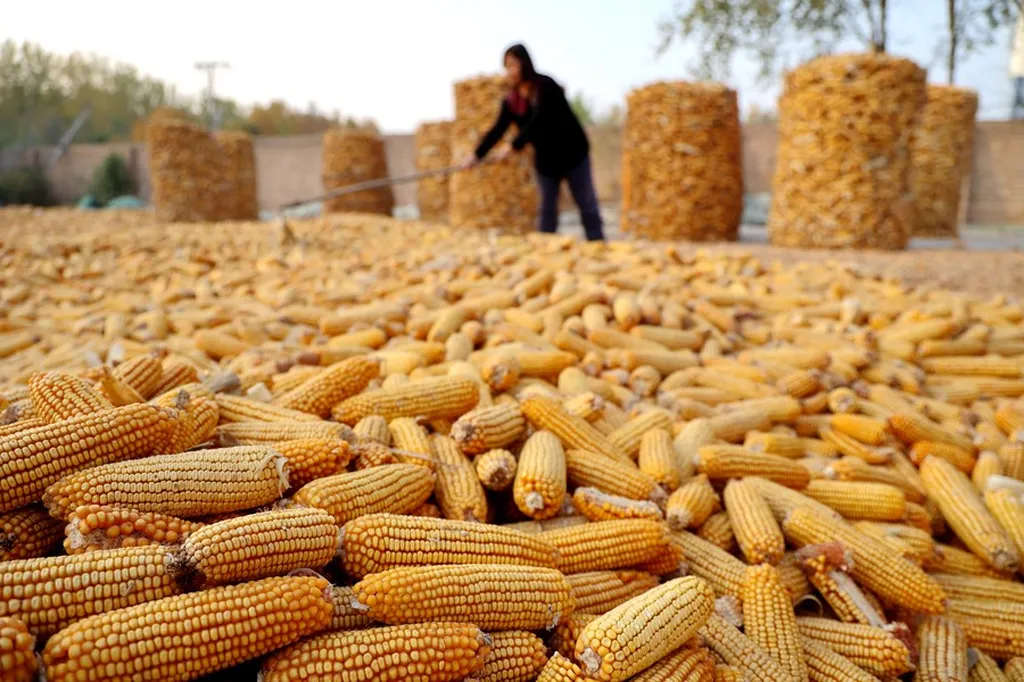In the heart of agricultural innovation, a groundbreaking discovery has emerged from the Biotechnology Research Institute of the Chinese Academy of Agricultural Sciences, promising to revolutionize the way we think about folate biofortification in crops. A team of researchers, led by Tong Lian, has identified a natural genetic variation in maize that could pave the way for developing folate-enriched maize varieties, potentially addressing micronutrient deficiencies in populations relying on maize as a staple food.
The study, published in the prestigious journal *Advanced Science*, focuses on a gene called glutamate formiminotransferase (GFT). The researchers identified a single nucleotide variation in the GFT gene, which results in a subtle change in the protein sequence. This variation, a glycine-to-asparagine substitution, significantly influences folate accumulation in maize seeds. “This natural variation is a game-changer,” says Lian. “It opens up new avenues for breeding maize varieties with enhanced folate content, which is crucial for human health.”
Folate, a form of vitamin B9, is essential for DNA synthesis and cell division. Deficiencies in folate can lead to severe health issues, including anemia and neural tube defects in newborns. The discovery of this genetic variation in maize could have profound implications for global health, particularly in regions where maize is a dietary staple.
The researchers found that the GFT gene encodes a protein that triggers the conversion of 5-methyl-tetrahydrofolate (5-M-THF) to MeFox, a lesser-known folate derivative. This conversion is a new metabolic pathway in plants, distinct from the well-known role of folate in methionine synthesis. “This is a significant finding,” explains Lian. “It reveals a previously unknown metabolic fate of 5-M-THF in plants, which could be harnessed to enhance folate levels in crops.”
The commercial impact of this research is substantial. By identifying this natural variation, breeders can now develop maize varieties with higher folate content through conventional breeding methods or genetic engineering. This could lead to the development of folate-biofortified maize seeds, which could be marketed to farmers and consumers as a healthier alternative. “This discovery has the potential to transform the agricultural sector,” says Lian. “It provides a clear target for breeders to develop crops that are not only more nutritious but also more resilient.”
The implications of this research extend beyond maize. The researchers validated the functional conservation of GFT in rice and Arabidopsis, suggesting that similar strategies could be applied to other crops. This could lead to a broader range of folate-biofortified crops, addressing micronutrient deficiencies in various agricultural systems.
The study also highlights the importance of understanding the genetic basis of nutrient accumulation in crops. By identifying the genes and pathways involved in folate metabolism, researchers can develop targeted strategies to enhance nutrient content in crops. This approach could be applied to other essential nutrients, leading to the development of crops with enhanced nutritional profiles.
In the broader context, this research underscores the potential of genetic variation to drive agricultural innovation. By leveraging natural genetic diversity, researchers can develop crops that are not only more productive but also more nutritious. This approach aligns with the growing demand for sustainable and nutritious food systems, addressing both food security and health challenges.
The discovery of this genetic variation in maize is a testament to the power of modern agricultural research. By combining genetic analysis, biochemical assays, and bioinformatics, the researchers have uncovered a new metabolic pathway that could have far-reaching implications for crop improvement. As we look to the future, this research provides a roadmap for developing crops that are not only more resilient but also more nutritious, addressing the pressing need for sustainable and healthy food systems.
The study, led by Tong Lian from the Biotechnology Research Institute of the Chinese Academy of Agricultural Sciences, was published in *Advanced Science*, highlighting the significance of this discovery in the scientific community. The findings open up new possibilities for agricultural innovation, paving the way for a future where crops are not only more productive but also more nutritious, addressing the global challenge of micronutrient deficiencies.

